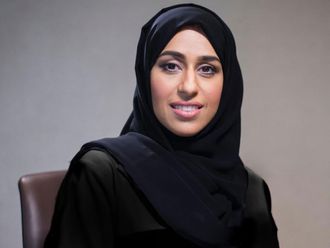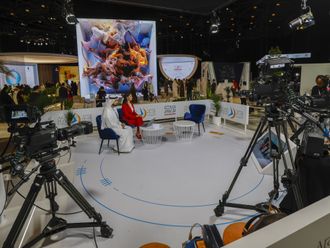Abu Dhabi: The UAE has issued the State of Energy Report in the UAE 2015, highlighting the best practices and success stories of national activities in the process of developing the energy sector.
The report also focuses on renewable energy contributions in the UAE’s energy diversification policy and energy efficiency criteria, as well as the consolidation of efforts to achieve clean, safe and sustainable energy as the main basis of promoting economic and social growth and development.
The report has been prepared in collaboration with the Dubai Carbon Centre of Excellence (DCCE) and the United Nations Development Programme (UNDP).
The UAE is currently undertaking fast-paced efforts towards diversifying energy sources and seeks to achieve a proportion of clean energy of up to 24 per cent of the overall energy in the UAE, according to the Ministry of Energy.
Dr Mattar Hamed Al Neyadi, Undersecretary at the Ministry of Energy, presented a copy of the report to Helen Clark, United Nations Undersecretary General and Administrator of UNDP, at a meeting held in Abu Dhabi.
Al Neyadi said that the report is the first of its kind in the region. “We are very proud of this achievement and also proud of the valuable cooperation of the UNDP in the preparation of the report,” said Al Neyadi.
Clark, who is also the former prime minister of New Zealand, said: “We really are very impressed that the UAE is making such significant efforts to look at renewables. We know that UAE has a lot of firsts in the field, a lot of wins. A significant oil producer like the UAE has taken this very important initiative.”
Clark was also presented with a copy of the Dubai Green Economy report which, according to the UAE Ministry of Energy, is also the first of its kind in the region.
Al Neyadi said that the UAE, at both government and student level, is cautious about energy and climate change.
A group of students from Dubai, Sharjah and the Western Region, from New York University and the Higher Colleges of Technology, who had contributed to the preparation of the report through the Carbon Ambassador Programme (CAP), also met Clark and shared their thoughts and contributions.
The CAP, launched by the Dubai Carbon Centre of Excellence, aims to stimulate the participation of a select group of university students in the areas of sustainable development, carbon emissions reduction and the ‘green economy’ in particular. The programme, which includes participatory workshops and activities in social awareness, will give the young an opportunity to interact with personal, local and international perspectives.
The energy report of 2015 also focuses on the importance of steps taken by the UAE in the context of its efforts aimed at defining the features of renewable energy and reducing the effects of climate change as part of international sustainability efforts. Within the framework of efforts to create a future based on sustainability, the energy report seeks to become a printed reference source of best practices and success stories in the field of sustainable energy in the UAE.
“The UAE, as a significant oil producer, is stepping out and looking at the broader issues of the transition to a greener economy and renewable energy, looking at the bigger picture and setting targets around how to make that transition,” said Clark in an interview with Emirates News Agency (WAM).
Clark said that the UAE does a lot of things first, the first country in the region to host the World Expo (Dubai World Expo 2020), and the first country to set up and build a fully sustainable city in Masdar (Masdar City), which she said is a visionary city.











